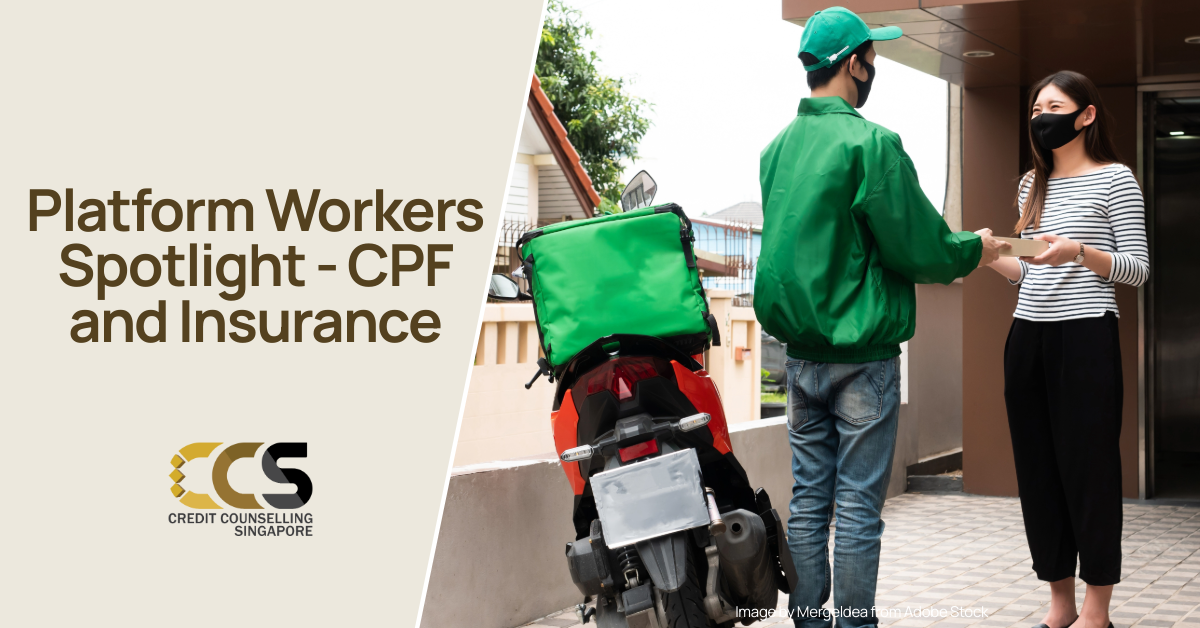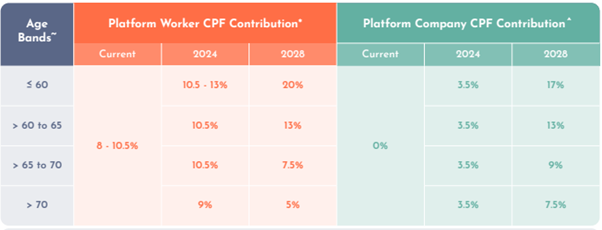Strengthening Protection for Platform Workers: CPF and Insurance

Need a ride to get to the concert of your favorite artist? Turn to any ride-hailing platform to easily book your ride while you select your outfit and style your hair.
Pressed for time to have a meal? Order a quick meal delivered using a food delivery app while you get ready to sing and dance through the night.
These modern conveniences are made possible by platform workers, who use online matching platforms to provide transport and delivery services. However, these conveniences may come with hidden costs for these workers. The issue of their financial insecurities and lack of financial protection has also been in the spotlight recently.
The Appeal of Gig Work: Unveiling the realities of platform workers
Many are drawn to being a platform worker due to the perceived flexibility of the job, the opportunity to be your own boss and to earn at their own time and pace. With the growing popularity of using mobile apps to order food and get a ride, it has never been easier for anyone who wants to work independently to find flexible, on-demand work through these digital platforms.
In reality, some platform workers find themselves in a “hand-to-mouth job” and an employment path that offers little room for career and income growth in the long term.
“Once you stop your hands, your livelihood is jeopardized,” Ms Thian Wen Li from the Institute of Policy Studies (IPS) said during the “Symposium on In-Work Poverty and the Challenges of Getting By Among the Young” in March 2023.
Platform workers find themselves in a grey area between traditional employment and self-employment. While they have control over their working hours, they lack the ability to set prices or build their own client base. Additionally, platform companies are not required to provide insurance coverage or Central Provident Fund (CPF) contributions, as is the case with regular employees.
These concerns have led the Government to accept the recommendations by the Advisory Committee on Platform Workers to strengthen protections for them.
Among the recommendations are improving housing and retirement adequacy and ensuring adequate financial protection in case of work Injuries.
CPF Contributions - Improving housing and retirement adequacy
The Ministry of Manpower announced that from the second half of 2024, platform workers under the age of 30 are required to contribute to their Ordinary Account (OA) and Special Account (SA). Those who are 30 and above have the option to contribute to their CPF if they wish. Platform workers who earn $500 or less in a month do not need to make CPF contributions.
At least 73,000 platform workers are expected to benefit from this policy. The CPF contribution rates will be gradually phased in over five years, reaching the same level as the contribution rates for traditional employees in 2028.
All platform workers currently contribute between 8% and 10.5% of their income into their Medisave account only.
When the policy kicks in later this year, platform workers will start contributing an additional 2.5% of their income. The additional contribution will go into their Ordinary and Special Accounts. This will bring their total CPF contributions to between 10.5% and 13%.
The CPF contribution rate will increase by about 2.5% each year, until it reaches the same rate as traditional full-time employees for their age group. For example, platform workers aged 60 or younger will eventually contribute 20% of their income into their CPF accounts in 2028.
At the same time, platform companies will also make contributions to their workers CPF. The rate will start off with a 3.5% contribution in 2024, increasing about 3.5% a year until 2028. Using the same example, for a platform worker aged 60 or younger, the platform company will make a 17% contribution to the worker’s CPF in 2028.

Reference: Table extracted from Ministry of Manpower. URL: https://www.mom.gov.sg/-/media/mom/documents/budget2023/infographic-on-platform-workers.pdf , retrieved on 19 April 2024.
In other words, in 2028, CPF contributions of platform workers aged 60 and below, and CPF contributions by platform companies will be 20% and 17% respectively, just like those of traditional full-time employees.
The mandatory requirement to make CPF contributions may result in lower take-home pay for platform workers earning less than $2,500 per month. For this group of workers, the Government will step in to help offset the increase in CPF contribution. The introduction of the Platform Workers CPF Transition Support (PCTS) will offset 75% of the increase in 2024, gradually tapering off to 25% in 2027.
For more information, you can MOM’s infographic on strengthening protections for Platform Workers here: https://www.mom.gov.sg/-/media/mom/documents/budget2023/infographic-on-platform-workers.pdf
Insurance and Injury Compensation - Ensuring adequate protection in event of work injury
From the second half of 2024, platform workers will be entitled to the same scope and level of work injury compensation as traditional employees under the Work Injury Compensation Act (WICA). To ensure platform workers are adequately protected in case of work-related injuries, platform companies must purchase work injury compensation insurance for them.
This is crucial because platform workers often work long hours to earn more, which can lead to fatigue and an increased risk of accidents. In the event of an accident, they may suffer income loss and unexpected medical expenses.
Implementation details will be announced at a later date.
Conclusion
The recommendations by the Advisory Committee on Platform Workers, aimed at strengthening protections for platform workers, particularly in terms of CPF contributions and insurance coverage, mark a significant step towards ensuring their financial security and well-being. With the policy change for CPF contributions, platform workers will be in a better position to plan ahead for their housing and retirement needs. Additionally, the extension of work injury compensation coverage to platform workers acknowledges the risks they face daily.
For platform workers to achieve financial security, it is essential for them to consider their long-term finances. The unpredictable nature of the gig economy and platform work underscores the need for savings, emergency funds, and sufficient insurance coverage.
Stay tuned for our next article, where we will share some simple tips and strategies for platform workers to thrive financially.
References:
| If you enjoy our articles, please follow and like our Facebook page. We post new content every week that you may find useful and engaging. |
Contributed by Credit Counselling Singapore
Published 22 April 2024.
